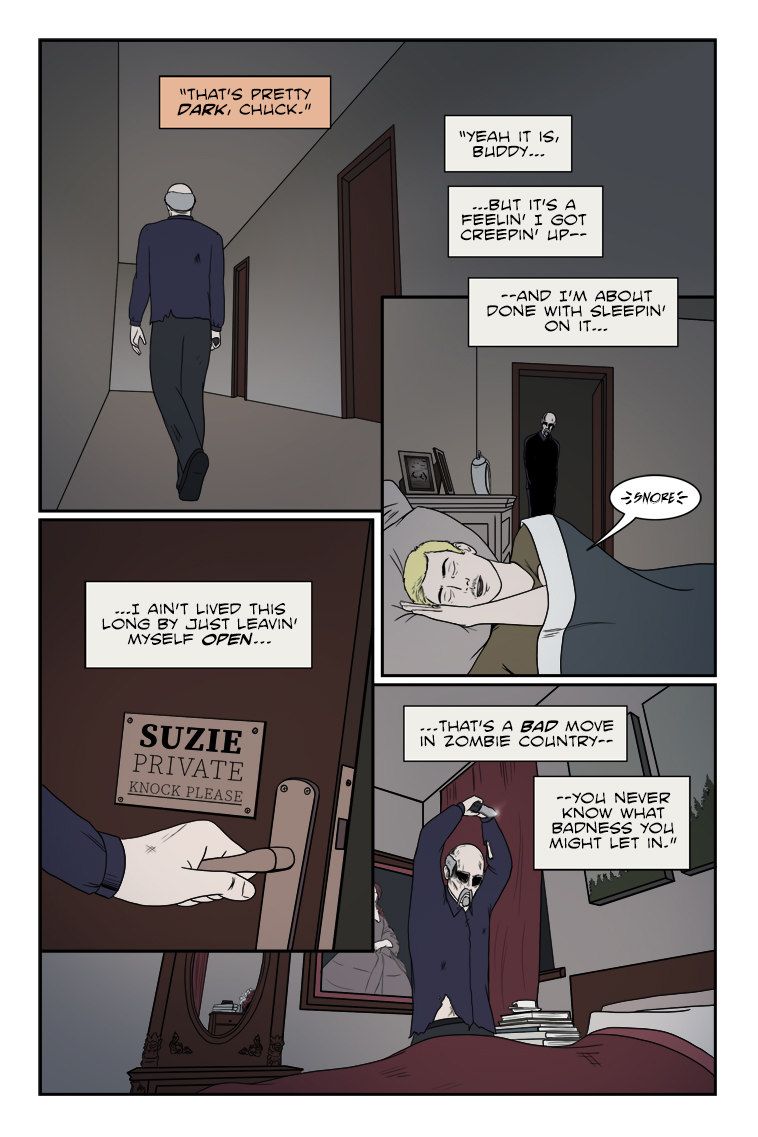Cart
Product categories
Support Us!
If you like what I do please support us on Ko-fi or Patreon.
Follow Us!
Join Our Newsletter!
Vote For Us!
Login
Polls
Events
-
Pasadena Comic Con
Dates: Jan 26
Location: Pasadena Convention Center, 300 E Green St, Pasadena, CA 91101, USA ( MAP)Details:We will be at the Pasadena Comic Con on January 26th. See some of you there for this one day event!
Purchase tickets online at here: https://www.tixr.com/groups/pcc/events/pasadenacomiccon-pasadena-comic-con-2025-115248









11 thoughts on “539 – A Knife In The Dark (END OF EPISODE 22)”
Keith
Why am I not surprised.
Scarsdale
Typical, it’s always someone else’s fault. Revenge is not just best served cold, but by stupid too. “This is all your fault!” Which is wrong, but in his head, it’s right.
steelraven
It’s also been heavily hinted he has already been brain washed by the zombie worshiping cult.
Scarsdale
Which, no doubt, made easier because of that under-lying feeling. People are always looking for a scape-goat…
Clint
I don’t know if you got my callback by intent or not, but it’s great to see almost the same words echoed! https://www.zombieranchcomic.com/comic/203-breaking-worst/
RC
Honestly, probably the first time he’s ever taken control of and done ever in his life. There’s a reason why they kept him. Give a dog that’s been beat all its life a whiff of conference and control, you got a problem.
Crazyman
Imagine his surprise when he stabs a pillow. 😜
Zombatar
He isn’t in control, RC – he’s probably drugged to the very dilated eyeballs, probably with Datura. Back on p.443, Eustace is shown holding a Mojave Rattlesnake on a stick while the Brujefe milks it into a glass. Mojave venom A is a paralytic neurotoxin, like tetrodotoxin. Tetrodotoxin was thought to be part of the legendary Haitian “zombie powder”. The other part was Datura, which contains scopalamine, which messes with memory and concentration, and is supposed to render victims docile and suggestible.
The question is, where did he get his current dose, and did a little drone whisper in his ear?
TKG
Except Datura doesn’t do that. You’re thinking of the compound Scoplolmine (AKA the devil’s breath) which generally comes from a specific plant, Borrochero (Brugmansia arbora) that is native to Columbia that the gang in question probably would have had access to. It’s active compound obliterates free will, your conscious, you can function as normal but you are totally open to suggestion which is what happened to McCarty here. Datura just makes you trip mad balls and maybe die, but it does not make you a puppet.
Dr. Norman (not a real doctor)
Me lleva la chingada !
TKG
I’m betting money there’s no one in that bed and it’s a ruse to get him caught.
Latest Comics
#160. 153 – Saving Face
15 Jan 23, 2013
#159. 152 – Memory Lame
13 Jan 16, 2013
#158. 151 – Traveler’s Check
15 Jan 09, 2013
#157. 150 – Counting Coup
16 Dec 19, 2012
#156. 149 – Repopularity
45 Dec 12, 2012
#155. 148 – Fashion Play
45 Dec 05, 2012
#154. EPISODE SEVEN
50 Dec 02, 2012
#153. 147 – Turning Point (END OF EPISODE 6)
44 Nov 21, 2012
#152. 146 – I Say Thee Neigh
46 Nov 14, 2012
#151. 145 – The Prod Gets Even
12 Nov 07, 2012
#150. 144 – Cloudy With A Chance Of Pain
14 Oct 31, 2012
#149. 143 – All Chucked Up
12 Oct 24, 2012
#148. 142 – Not Even A Cigarette
14 Oct 17, 2012
#147. 141 – Three Up, Three Down
14 Oct 10, 2012
#146. 140 – Spoken Promises
15 Oct 03, 2012
#145. 139 – Family Matters
12 Sep 26, 2012
#144. 138 – Dealing Out
15 Sep 19, 2012
#143. 137 – A Conscience Decision
12 Sep 12, 2012
#142. 136 – Teed Off
17 Sep 05, 2012
#141. 135 – Fluid Mechanics
13 Aug 29, 2012
Latest Chapters
Episode 22
Episode 21
Episode 20
Episode 19
Episode 18
Episode 17
539 – A Knife In The Dark (END OF EPISODE 22)
Happy Holidays, all! That's a wrap (heh) for Episode 22 just in time for a Christmas cliffhanger! Hope we don't twist the knife too much...
See y'all in 2025 when Zombie Ranch continues!
Independent thoughts…
Calendar
Writer’s Blog Archives